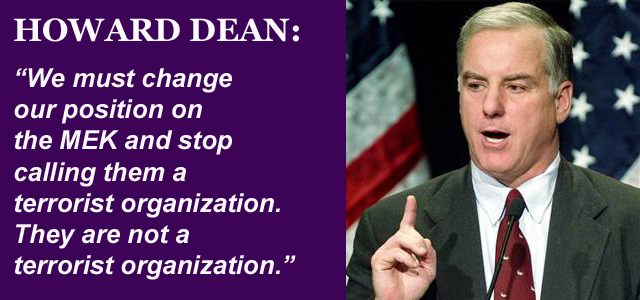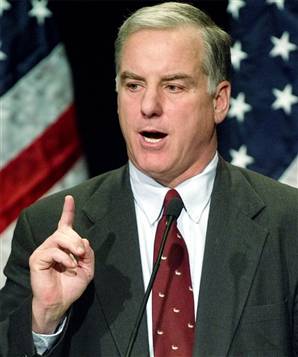THE WASHINGTON TIMES
Refusal to remove MEK’s terrorist designation betrays democracy
With Iran reportedly making progress on its nuclear program, Secretary of State Hillary Rodham Clinton has an opportunity to recognize an Iranian opposition group that is dedicated to democratic reform; has a secular, pro-Western outlook, and is most feared by the Iranian rulers. There’s only one catch: She must first remove the group from the U.S. list of Foreign Terrorist Organizations (FTO).
Removing any group from the FTO list is never easy, as doing so inevitably runs the risk of being seen as soft on terrorism. But, if ever there were a case for so acting, it is with regard to a group known as the Mujahedin-e Khalq (MEK).
Indeed, the MEK should never have been designated as an FTO in the first place. An ardent opponent of the mullahs who run Iran, the MEK was put on the U.S. list in 1997 as a gesture to Tehran at a time when U.S-Iranian relations seemed to be thawing.
The group had engaged in armed resistance first to the shah and later against the mullahs as a last resort because both regimes had eliminated the last vestiges of peaceful political activity. As a result, the Iranian government has jailed, tortured and executed tens of thousands MEK members. Many of its members, mostly former political prisoners, have fled Iran since the 1980s, with several thousand settling in Camp Ashraf in Iraq.
At the end of the Iraq war, the MEK disarmed under the supervision of the U.S. Army and renounced violence. It has embraced its own bill of rights that calls for a free and democratic Iran. The MEK has endorsed the emancipation of women, the separation of government and religion in Iran, the ability of Iranians to worship as they choose, and adherence to internationally recognized human rights. In light of these actions, MEK members in Camp Ashraf were deemed “protected persons” under the Fourth Geneva Convention and were to be shielded by the U.S. military.
Other governments have recognized that the MEK is not a terrorist group. In 2008 and 2009, respectively, Britain and the European Union removed the MEK from their lists. Some 90 members of Congress have called for the MEK to be removed from the U.S. list, and the bipartisan support is growing.
In addition to myself, former national security officials from the Obama, Bush and Clinton administrations have joined this call, including John R. Bolton (U.N. ambassador), Andrew Card (White House chief of staff), Gen. Wesley Clark, Louis J. Freeh (FBI director), Gen. James L. Jones (national security adviser), Gen. Richard Myers and Gen. Peter Pace (chairmen, Joint Chiefs of Staff), Gen. James T. Conway (commandant of the Marine Corps), Michael B. Mukasey (attorney general), Tom Ridge (Homeland Security secretary), Howard Dean (Vermont governor), Bill Richardson (New Mexico governor), and Togo D. West Jr. (Secretary of the Army), to name just a few
Despite these developments and the fact that a nonviolent, disarmed group cannot as a matter of law be an FTO (the use of violence is the fundamental criterion for such a designation), the State Department so far has delayed the delisting of the MEK. A federal appeals court in July 2010 ordered the department to reconsider its position. All deadlines have come and gone.
This inaction has had tragic consequences. On April 8, thousands of Iraqi troops, backed by Humvees and armored personnel carriers, invaded Camp Ashraf and killed 36 residents and wounded hundreds more, all MEK members. The United States failed to safeguard Ashraf despite its pledge to do so. The unarmed residents had no means of resistance and they remain under threat.
Members of Congress attempted to investigate the attack but were turned away by the Iraqi government, which cited the U.S. terrorist designation as a reason to wall off the camp from U.S. lawmakers as well as to justify its violent treatment of the residents.
The FTO designation not only imperils the people of Ashraf, but it also casts a shadow on a group that is working to advance the values the United States has long hoped to see in Iran. The MEK is not a terrorist group and it is time for the United States to join our partners in the EU and Britain and take the MEK off the FTO list.
Any delay in delisting the MEK runs the risk of undermining the values of our nation based on the rule of law. It sends the wrong signal to Iran, the most active state exporter of terrorism, that it can continue to use its proxies to eliminate its opponents and evade the consequences. The regime in Iran wants nothing less than eliminating the MEK, which it views as a threat. They desire to see the MEK members at Camp Ashraf eliminated, thus killing the hope for change in Iran. As a great nation, we should not stand by and allow this to happen.
Gen. Henry H. Shelton is the former chairman of the Joint Chiefs of Staff.
http://www.washingtontimes.com/news/2011/aug/25/unshackle-irans-main-opposition/


